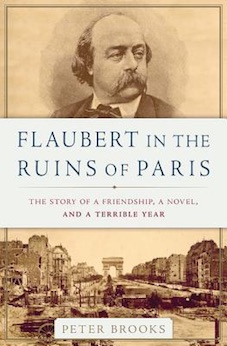By Benjamin Franklin Martin
L’année terrible, the “Terrible Year” in France, July 1870 to June 1871: The Second Empire is goaded into war with Prussia; the Empire collapses with the defeat and capture of Napoleon III; a Republic is declared in Paris and fights on; Paris is besieged then surrenders; national elections produce a constituent assembly with a monarchist majority which agrees to a harsh peace treaty; Paris revolts against the assembly; civil war between the Paris Commune and the assembly leads to thousands of deaths and to massive destruction within the capital.
In early June 1871, only days after the Commune’s brutal suppression, Gustave Flaubert and his friend Maxime Du Camp toured the ruins, Flaubert saying, “If they had understood The Sentimental Education, none of this would have happened.” With intellectual arrogance, he was referring to his novel, published a year and a half earlier, in which he had described the class warfare during the Revolution of 1848 and the failure of his generation to understand the forces of history.
Striking out wildly at what he believed the causes of this national catastrophe, Flaubert wrote to his closest confidante, George Sand (Aurore Dupin) that the Second Empire “was all fake; fake realism, fake army, fake credit, even fake whores” (April 30, 1871), that the French were “divided between cretinism and delirium tremens” (June 14,1871), about “how tired I am of the ignoble worker, the inept bourgeois, the stupid peasant, and the odious priest!” (September 6, 1871), that “the whole democratic dream is to raise the proletarian to the same level of stupidity as the bourgeois” (October 7, 1871), and that “I would like to drown my contemporaries in the latrines” (November 14, 1871).
Such a reaction is the genesis of this perceptive and provocative book by Peter Brooks (ΦBK, Harvard, 1959), who, like Flaubert himself, argues for the prescience of The Sentimental Education in making clear the costs incurred by “radical revision of the way things are” and insists on “the role of human agency in the making of history.” The lesson from the “roulette wheel of history,” from the recurrent shifts in power and their attendant violence in France after 1789, was “the tragicomic inability of human beings to produce the results they seek in management of public affairs.” Self-delusion led to disaster in the Terrible Year.
Benjamin Franklin Martin (ΦΒΚ, Davidson College, 1969) is Price Professor of History Emeritus, Louisiana State University.




